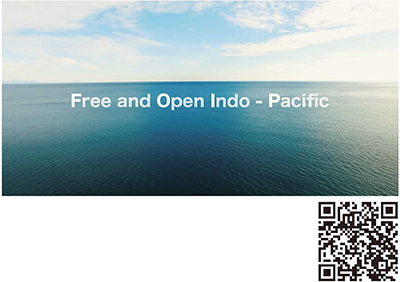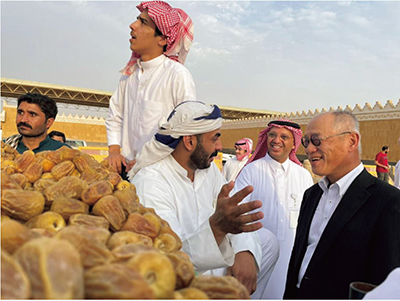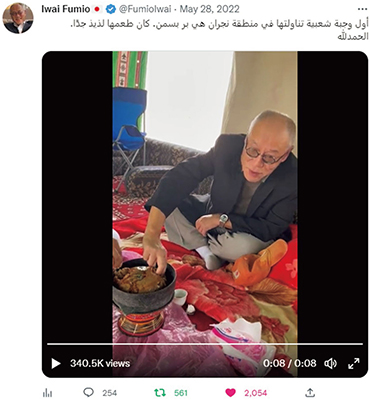Diplomatic Bluebook 2023
Chapter 3
Japan's Foreign Policy to Promote National and Global Interests
Section 4 Efforts to Promote Understanding and Trust in Japan
1 Strategic Communications
(1) Initiatives in Strategic Communications
With a free, open, and stable international order facing grave challenges, and Japan confronting its most severe and complex security environment since the postwar era, it is becoming increasingly important for Japan to communicate its foreign policies and recognition of international situation to other countries. The Ministry of Foreign Affairs (MOFA) is implementing strategic communications based on the three-pillar approach of (1) making further efforts to disseminate Japan's policies, initiatives and positions, (2) sharing Japan's rich and diverse attractions, and (3) expanding the circle of people with a great affinity toward or knowledge of Japan, while enhancing the capabilities of its overseas missions, which are on the frontlines of public diplomacy. Regarding pillar (1), MOFA focuses mainly on promoting public understanding of Japan's contributions to peace, stability and prosperity in the international community, and the maintenance and strengthening of the international order based on the rule of law, as well as on enhancing public awareness of issues concerning the recognition of history and territory/sovereignty. In particular, MOFA is actively communicating Japan's positions and viewpoints through opportunities such as daily press conferences, interviews, contributions of articles, and speeches at official visits to foreign countries and international conferences by the Prime Minister, the Foreign Minister, and other government officials. Japan's diplomatic missions overseas are also communicating to the governments of assigned countries, their citizens and the media on Japan's positions and viewpoints on a range of subjects including the recognition of history and territory/sovereignty. When foreign media outlets publish reports that include factual errors, the MOFA Headquarters and diplomatic missions overseas promptly lodge protests or post rebuttals, to ensure that media reports are made based on objective facts and understanding. In addition, MOFA actively communicates with the public through online tools such as its official website and social media, while creating publicity materials such as videos on Japan's foreign policy and utilizing them in a variety of forms. Furthermore, in order to make Japan's basic positions and viewpoints on policy issues understood, it is also important to enhance coordination with experts and think tanks. From this perspective, MOFA invites influential experts and media personnel to Japan from abroad, and provides them with opportunities to exchange views with various people including Japanese government officials, as well as to visit various places around Japan for study tours and to conduct interviews. MOFA dispatches Japanese experts abroad, while extending its support for Japan-related seminars conducted by overseas research institutions.
 Policy promotion video, “Free and Open Indo-Pacific (FOIP)” (English) (Posted on MOFA's YouTube channel from March 17, 2022)
Policy promotion video, “Free and Open Indo-Pacific (FOIP)” (English) (Posted on MOFA's YouTube channel from March 17, 2022)In 2022, the situation became more complex as the international order faced great challenges due to Russia's aggression against Ukraine, while the international community was urged to cooperate in order to respond to climate change and other global issues. Against this backdrop, MOFA made use of various diplomatic opportunities and initiatives to communicate strategically on Japan's basic stance and efforts toward global issues as well as in maintaining and strengthening the international order based on the rule of law. Moreover, MOFA worked to strengthen institutional functions, such as through close cooperation between the information departments and the publicity and policy departments, in order to respond to information warfare in the cognitive domains, including the spread of disinformation. The National Security Strategy approved by the Cabinet Decision in December, too, stresses the importance of addressing disinformation.
Furthermore, MOFA continued with initiatives that can be implemented without in-person exchanges, such as online seminars (webinars) and exchange programs, with a focus on invitational and dispatch programs as well as cooperation with research institutes overseas and other organizations. With the resumption of projects involving cross-border travel, MOFA implemented projects that were conducted both in-person and online.
By taking advantage of various opportunities and utilizing various tools, Japan is also engaged in efforts to strategically communicate information about matters on the recognition of history, including the issue of the so-called “comfort women” and various issues on Japan's territory and sovereignty. For baseless criticism of the Rising Sun Flag, accurate information about the flag is provided in a variety of forms, including making multi-language explanatory materials and videos available on MOFA's website to gain understanding from the international community1.
With regard to sharing Japan's rich and diverse attractions, a variety of efforts involving public relations and cultural projects are being made mainly through diplomatic missions to promote understanding and support for Japan, which will also lead to the promotion of inbound tourism in the post-COVID-19 world. Cultural projects have been conducted by diplomatic missions around the world and the Japan Foundation (JF), and the 16th Japan International MANGA Award was organized by MOFA. The attractiveness of all regions of Japan was also communicated through various means including social media. Amidst the gradual resumption of projects alongside the recovery of international travel, projects were implemented both in-person and through online formats with the aim of maintaining and further developing Japan's ties with the world through culture. Moreover, Japan has worked on initiatives in cooperation with people in the country and abroad to preserve tangible and intangible cultural heritage throughout the world and to promote the inscription of Japan's cultural and natural heritage on the World Heritage List and the Representative List of the Intangible Cultural Heritage of Humanity. Concerning pillar (3), “expanding the circle of people with a great affinity toward or knowledge of Japan,” MOFA has been making various efforts to promote people-to-people and intellectual exchanges, and Japanese language education. The efforts include youth exchange programs between Japan and other countries and regions under Japan's Friendship Ties Programs. MOFA also supports Japanese studies at universities and research institutions in major countries around the world. In order to contribute to the realization of its foreign policy and national interests, MOFA will continue to strategically and effectively implement initiatives based on the abovementioned three pillars.
- 1 Reference materials concerning the Rising Sun Flag are available on the website of the Ministry of Foreign Affairs here:
(1) https://www.mofa.go.jp/a_o/rp/page22e_000892.html
(2) Video link: https://www.youtube.com/watch?v=9co0U5lcE0c
“Rising Sun Flag as Japanese Longstanding Culture”
(Posted on MOFA's YouTube channel from October 8, 2021) (1)
(1) (2)
(2)
(2) JAPAN HOUSE
MOFA has established JAPAN HOUSE overseas communication hubs in three cities, namely São Paulo (Brazil), London (UK) and Los Angeles (U.S.). The purpose is to attract a wide range of people, including those who were not necessarily interested in Japan previously, and to enlarge the base of the people with great affinity toward or knowledge of Japan by communicating Japan's rich and varied attractiveness as well as its policies, initiatives, and views.
JAPAN HOUSE promotes effective communication by (1) communicating through “All-Japan” efforts by the central and local governments, private sectors and other actors, (2) promoting outreach that reflects the needs of local communities, and (3) providing a “one-stop-service” where various information related to Japan can be obtained from one location.
With the slogan “Mind-blowing Encounters with Japan across the Globe,” each JAPAN HOUSE conducts locally designed exhibitions which are independently organized by each hub, as well as touring exhibitions that are selected by experts from public proposals in Japan and exhibited at all three hubs. In this way, JAPAN HOUSE works to provide high-quality exhibitions by leveraging the knowhow of experts both in those hub cities and in Japan. In addition to exhibitions, Japan's diverse attractions, including traditional culture and arts, advanced technology, nature, architecture, food and design, as well as its policies, initiatives and views, are also widely disseminated through other formats such as lectures, seminars, workshops, webinars, library spaces, websites and social media, merchandise, food and beverages, and cafés. JAPAN HOUSE is also currently working actively to win over new audiences by conducting some exhibitions in other cities or in neighboring countries, as well as by further promoting online communication and expanding hybrid methods that combine in-person and online formats, following the COVID-19 pandemic. By the end of 2022, the total number of visitors for the three hubs had exceeded 4.7 million, indicating that the hubs are becoming firmly established as a major cultural facility in each city.
(3) Media Coverage of Japan in Other Countries and Regions, and Dissemination to Foreign Media
In 2022, foreign media coverage of Japan was centered on diplomatic issues such as its response to the situation over Ukraine, President Biden's visit to Japan and the Japan-Australia-India-U.S. (Quad) Leaders' Meeting, the Eighth Tokyo International Conference on African Development (TICAD 8), Japan-China relations, Japan-ROK relations, and the issues concerning North Korea, as well as the state funeral for the late Prime Minister ABE Shinzo, border measures in relation to COVID-19, strengthening of defense capabilities, energy policies, and exchange rate fluctuations, among other topics.
MOFA promptly and proactively provides information and assistance to foreign media in order to gain the understanding and support of the international community on Japan's policies, initiatives and positions. Communication through foreign media includes interviews with the Prime Minister and the Foreign Minister, regular press conferences by the Foreign Minister (livestreaming in Japanese and English is also available online), and the provision of information and opportunities for press coverage to correspondents in Tokyo via briefings, press releases, press tours and other means. MOFA makes efforts to achieve strategic and effective communications by providing information in a timely manner based on the diplomatic schedule.
With the resumption of in-person diplomacy in 2022, Prime Minister Kishida and Foreign Minister Hayashi actively traveled overseas and provided information to foreign media outlets through interviews and contribution of articles. For example, when TICAD 8 was held in August, Prime Minister Kishida and Foreign Minster Hayashi contributed to several papers including the major media outlets of Tunisia, the host country, and communicated that Japan would continue to contribute to sustainable development led by Africa going forward. Furthermore, Prime Minister Kishida also made use of other timely opportunities, apart from overseas trips, to provide information proactively, including responding to an interview request by the Financial Times in October, in which he appealed for the need to strengthen defense capabilities.
In 2022, the Prime Minister contributed articles and held interviews 15 times, and the Foreign Minister contributed articles and held interviews for a total of 17 times. Additionally, MOFA provided information to foreign media through the Press Secretary and other means, and held press briefings to local media on the occasion of overseas visits by the Prime Minister and Foreign Minister. Under the project to invite foreign media coverage, MOFA extended invitations coupled with visits to Japan alongside coverage in online format, corresponding to the status of border measures. In 2022, 26 invitation programs were provided (of which six were coupled with visits to Japan, and 20 were coverage in online format), and more than 231 journalists from 137 countries participated in the project.
(4) Information Provision Through the Internet
In view of the increasingly active use of online media, MOFA has been actively engaged in providing information through the Internet, such as the MOFA websites and social media, in order to gain better understanding and draw further support of people inside and outside Japan on Japan's foreign policy. In 2022, MOFA actively provided information on the situation in Ukraine, along with live streaming of the regular press conferences by the Foreign Minister (in Japanese and English), and posting of video messages delivered at international conferences.
Considering MOFA's English website to be an important tool for public diplomacy, MOFA has been enhancing its efforts to provide information in English on Japan's foreign policy concerning such subjects as territory and sovereignty, recognition of history, and security, as well as Japan's position on international affairs and Japan's diverse appeals. MOFA has also been working to provide information in local languages through the social media and the websites of Japanese embassies, consulates-general, and permanent missions overseas (see the Column on page 321).
Social media has long been described as an effective tool for exerting soft power in diplomatic activities, and MOFA, too, actively uses the Internet to disseminate information on culture, sports, tourism, and other subjects.
I first dipped my toes into the world of social media in 2015 when I assumed office as the Ambassador of Japan to Iraq in the capital city of Baghdad, where I created a Facebook account due to unavoidable reasons, including the security situation at the time. Based on that experience, when I was assigned to Saudi Arabia in February 2021, I created a Twitter account the day after I arrived in the capital city of Riyadh because there was a large number of Twitter users in Saudi Arabia. I began to tweet and have gained approximately 97,000 followers(Note) to date.
Bilateral relations between Japan and Saudi Arabia are closely linked to the economic field, as Japan imports oil from Saudi Arabia and exports products such as Japanese cars to the country. Against the backdrop of the recent popularity of Japanese anime and manga worldwide, there are also many fans of Japan in Saudi Arabia. However, the reality on the ground is that little is known about Japanese culture and its society apart from these aspects. Accordingly, in my tweets, in addition to my diplomatic activities as an Ambassador, I also tweet about various other topics such as Japan's climate and culture, and even about my own family at times.
 Exchanges during the Al Qassim Date Festival (the author on the far right) (August)
Exchanges during the Al Qassim Date Festival (the author on the far right) (August) A video post of Ambassador Iwai eating with his hand in the traditional Saudi-Arabian style, when visiting a provincial region. The video was played 340,000 times. (May, Najran, Saudi Arabia)
A video post of Ambassador Iwai eating with his hand in the traditional Saudi-Arabian style, when visiting a provincial region. The video was played 340,000 times. (May, Najran, Saudi Arabia)When I tweet, I am mindful of communicating in the local language, which is Arabic. I also read every comment that I receive after tweeting, and where necessary, reply and try to reach a mutual understanding with my followers. There is a tendency to think of diplomats as special people, but through these exchanges, I aim to show that we stand with the people. Among my comments, there are people who tell me that they got to know about Japan or feel closer to Japan through my tweets, as well as some who say that they would like to visit Japan. This gives me a real sense of growing affinity toward Japan among the people of Saudi Arabia.
Furthermore, while reading the comments meticulously, identifying the interests and values of the people of Saudi Arabia is also important to learn about the society of the country I am assigned to. As I receive many heartwarming comments in response to my tweets about my family or football, it is clear to me that the people of Saudi Arabia place great importance on family and enjoy football. There were also times when I tweeted a simple and personal question but received comments objecting to the tweet, followed by further rebuttals to the initial comment in question, which in turn led to a major debate on Twitter. In such cases, I may have unintentionally “trodden on the tiger's tail,” as the Japanese saying goes, of Saudi Arabian society.
As an Ambassador, I am happy when I can get a real sense that not only sending out information through Twitter but also engaging in exchanges with citizens through comments contributes to deepening mutual understanding, raising awareness about Japan, and fostering goodwill toward Japan. If we think of soft power's purpose as “something that instills, deep in the minds of people, a desire to support Japan in times of need,” then I believe there is still immense potential for using social media to advance diplomatic activities, and that it is something worth pursuing.
- (Note) As of December 2022

